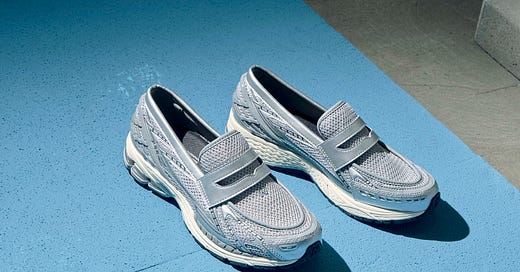Yes, words, plural. Because when you keep track of interesting new and newly prominent words all year long, as I do, you have a tough time settling on just one word of the year (WOTY).
Other deciding bodies are more, well, decisive. Cambridge Dictionaries chose manifest. Collins Dictionary selected brat. (See my post on brat from June.) The Economist chose kakistocracy (one of my own words of the week in November). Merriam-Webster straddled the divide with polarization. Oxford University Press, which invited the public to vote on a shortlist, picked brain rot, about which I’ll have more to say further down. Australia’s Macquarie Dictionary chose enshittification; if that sounds familiar, it’s because it was the American Dialect Society’s WOTY for 2023.1 Still to come: the ADS 2024 selection, which will be voted on at the society’s annual conference, in Philadelphia, on January 5. You can send the ADS your own selection(s) using this form.
Also: Check out Jim Asher’s December WOTY countdown. Love his Connections cards!
And that’s only the English-language WOTY winners! The German Association for German Language — it’s in Germany, in case you had any doubt — selected ampel-aus, which translates to “traffic light off” and refers to the demise of Germany’s SPD-Greens-FDP “traffic light coalition” (Ampelkoalition), whose respective colors are red, yellow, and green.
More to come, I’m sure! Meanwhile, here are the words I found most interesting, distinctive, novel, or relevant in the last twelve months. As in past years, I’ve followed American Dialect Society guidelines: “Word is broadly defined to include multiword phrases, compounds, idiomatic expressions, and even emoji that behave like single lexical items.” You’ll find links to all my past WOTY lists at the bottom of this post.
This is a long newsletter! Probably too long for email. Why not read it in your browser or in the Substack app? And then click the little heart if you enjoyed it.
Politics
BlueAnon. What QAnon was (and maybe still is) to the conspiracy-minded far right in the U.S., BlueAnon — named for the color’s association with the Democratic Party — is to the conspiracy-minded left. BlueAnon adherents “posit Donald Trump’s engagement in elaborate schemes to unlawfully seize or maintain control of the United States Government, independently or as the object of manipulation by foreign governments” (Wikipedia). The term was coined sometime after 2017, the year QAnon emerged; it gained prominence in 2024.
Coconut. The tree and its fruit became associated with Democratic Presidential candidate Kamala Harris, who liked to tell a story in which her late mother — an Indian immigrant to the U.S. — said chidingly, “You think you just fell out of a coconut tree?” Read my July 29 post about coconut.
Couch-fucker. An epithet for Vice President–elect JD Vance. See my August 3 post for the Strong Language blog.
Double hater. A person who did not favor either major party in the 2024 U.S. Presidential election. As early as March, some news outlets were predicting that “double haters” would determine the election’s outcome (MSNBC); Axios wrote about double haters in May, and after President Biden withdrew in late July, Washington Post columnist Philip Bump wrote about “the decline of the 2024 double hater.”
First buddy. The title Elon Musk has bestowed upon himself to describe his relationship with the President-elect.
Grifting cicada. Green Party candidate Jill Stein popped up on the Presidential ballot again this year and then disappeared, presumably until the next election cycle. (Stein received 782,235 votes in the general election, or 0.5 percent of the total.) That dubious M.O. earned her the title “grifting cicada,” after the insect’s habit of lying dormant underground for years before emerging and wreaking havoc on crops. Various people (see this Instagram post from @luvvie) have credited humor writer Wendi Aarons with coining “grifting cicada,” but I haven’t tracked down the original citation.
Sanewashing. Portraying a statement (by a political figure or other newsmaker) as more coherent than it actually is. Used frequently in 2024 to refer to U.S. media’s sanitizing of candidate Trump’s ramblings. Read my September 9 post about sanewashing, which includes references to other kinds of -washing.
Technology
Instamom. A mother who runs an Instagram account for her teen or preteen daughter, sometimes with unsavory consequences. The earliest citation I found for the term is from November 14, 2015 (“A Stage Mother for Social Media,” New York Times), but it spiked in the media this year thanks to an investigation published in February in the New York Times whose headline read “A Marketplace of Girl Influencers Managed by Moms and Stalked by Men.” See also Christmas, Every Day (2024), a short documentary about two such girls.

Slop. When I wrote about AI “slop” last month, I quoted Benjamin Hoffman’s article for the New York Times: “Google suggesting that you could add nontoxic glue to make cheese stick to a pizza? That’s slop. So is a low-price digital book that seems like the one you were looking for, but not quite. And those posts in your Facebook feed that seemingly came from nowhere? They’re slop as well.” In a September post for his newsletter,
, Max Read declared that “we’re in our slop era” and coined the useful term “sloptrepreneur,” which tells me that “slop” is linguistically productive. (I’ve been tracking -preneur coinages for a long time. See the column I wrote ten years ago for the Visual Thesaurus: “A Very Enterprising Suffix.”)X-odus. That sound you heard this year was thousands of social-media users deleting their profiles on an increasingly Musky X. (I was one of them.) The Guardian and The Week were among the mainstream publications that referred to the trend as an “X-odus.”
Money
Debank. To close a (bank) account because the account holder is regarded as a risk. The term was coined (pun intended) sometime in the last few years by analogy with deplatform; it appeared in multiple news stories in 2024 when people associated with cryptocurrency ventures complained that their bank accounts were unfairly being canceled. (Yes, there is some irony there.) Not to be confused with DeBank, which purports to offer “Whale Asset Tracking, Paid Consultations, and Web3 Dynamic Community,” whatever that means.
HENRY. An acronym for High Earner, Not Rich Yet. As Yahoo Finance put it in January, HENRYs are “typically younger people who may be just getting started in their careers but are already earning six-figure salaries. However, they lack the assets you'd typically expect a high earner to have such as a home, retirement accounts or other investments.” An August story in the Wall Street Journal (“Meet the HENRYs”) observed that a HENRY’s greatest fear “is becoming a HENRE: high earner, not rich ever.”
Noping out
4B. Shorthand for a Korean feminist movement that translates to “Four No’s”: no marriage, no childbirth, no dating, no sexual relationships. After Donald Trump’s victory in November, the New York Times reported that some American women were encouraging similar defiance. John Kelly analyzed the origins of 4B in a November 13 post on his blog, Mashed Radish.
Brain rot / bed rotting. Brain rot is not a new term — Henry David Thoreau is thought to have coined it, in 1854 — but it “has taken on new significance in the digital age, especially over the past 12 months,” as Oxford University Press put it in a December 2 post explaining its Word of the Year selection. “‘Brain rot’ is now seeing more widespread use, such as in mainstream journalism, amidst societal concerns about the negative impact of overconsuming online content.” The related term bed rotting, “a new trend sweeping TikTok,” according to Health, “involves staying in bed for extended periods of time—not to sleep, but to do passive activities.”
Girl mossing. Think of it as the opposite of girl-bossing: “taking time to unplug and recenter yourself . . . to put the papers down and put the laptops away so you can focus on frolicking in the forest or lounging on rocks by riverbanks” (Girls’ Life, February 10, 2024). Girl moss was coined by journalist Daisy Alioto in a 2022 tweet: “The girl boss is dead, long live the girl moss (lying on the floor of the forest and being absorbed back into nature).” The Conversation reported on the trend in June 2024: “This connection with nature is frequently coupled with the desire for rest and repair, in contrast to (and representing recovery from) the speed of capitalist hustle culture.”
Culture
Pretendian. A portmanteau of pretend and Indian, used pejoratively to describe someone who falsely claims Indigenous American identity. The term has been around since at least 2018 but was especially prominent in 2024, when PBS aired an episode of A People’s History of Native America that asked “What’s the deal with ‘Pretendians’?” and the New Yorker published Jay Caspian King’s investigation into accused Pretendian Elizabeth Hoover, a professor at Brown and UC Berkeley. The “Pretendians” podcast launched in May, promising to reveal “unbelievable stories of audacious fraudsters and investigate the complex phenomenon of Indigenous identity theft.”
Tonic. This old word was newly prominent in disparate contexts. I wrote this year about social tonic — liquid refreshments spiked with THC, CBD, or adaptogens — and about tonic masculinity, an alternative to “toxic masculinity,” the dominant mode of bro-dom (see below).
Tunnel fit. “Fit” as an abbreviation for “outfit” has been documented since at least 2008. The tunnel fit is specific to professional football and basketball: as
put it in a long and well-illustrated May 2024 post, “it’s the outfit a basketball player is photographed in while walking through the tunnel from the arena entrance to the locker room.” Tunnel fits have been the subject of intense fashion and sports coverage (see this February 2024 High Snobiety overview. this August 2024 Athlon Sports story about Indiana Fever player Caitlin Clark’s pregame ensemble; and this TikTok account devoted to NFL tunnel fits). A backlash was probably inevitable: In October, the New York Times reported on Washington Wizards player Kyle Kuzma’s “leaving the tunnel fit game behind,” abandoning his “once outlandish outfits” in favor of “a variation of a banal gray sweatsuit for each tunnel walk into the arena.”Snoafer. New Balance, which introduced a unisex sneaker-loafer hybrid in June after teasing it for ten months, may call the style a “loafer,” but it quickly became known in the press and by shoe fans as the “snoafer.” (Officially, it’s the 1906L; the L stands for “loafer.”) “Rather than march toward the couch, the snoafer takes an express elevator to the executive suite,” the Wall Street Journal reported in April. “It is a sneaker that dares to be worn with a suit.” Related fashion portmanteau: Scoat, a portmanteau of scarf and coat and the outerwear look that was “winter’s must-have and most copied item,” per the New York Post. The style was priced at $159.99; it’s currently sold out on New Balance’s website.
Vibe. As an abbreviation for “vibration” — the intangible, “feelings” variety — vibe has been in use since at least 1967. This year, however, saw a focus on vibes in new contexts. There was said to be a vibe shift in the U.S. national election. (True, but not in the way the opinionators had opinionated.) Vibes — “the distinct emotional response we experience when interacting with the world around us,” as a Forbes contributor put it in August — would likely determine the election’s outcome. Kamala Harris picked Tim Walz as her running mate because of his “good vibes” or his “peak Midwestern-dad vibes.” Then, in November, we saw a string of stories about a copyright lawsuit in which one 20-something “influencer” sued another 20-something “influencer” for closely imitating — the New York Times said “stealing” — her “clean girl vibe.” “Can the legal system protect the vibe of a creator?” asked The Verge. “And what if that vibe is basic?” | Strong contender for overall Word of the Year.
Health
Food noise. Obsessive or intrusive thoughts about food that are quieted when a person takes a GLP-1 receptor agonist like Ozempic or Wegovy. There were occasionally references to food noise prior to 2024, but the term appeared much more frequently this year (Google Trends).
Oatzempic. The “viral oat drink” made from oatmeal, lime juice, and water that was promoted as a weight-loss formula with effects similar to the GLP-1 drug Ozempic. Does it work? Sure, said the Mayo Clinic’s Tara Schmidt, “but so can drinking [insert ANY beverage here], as long as you’re in a caloric deficit.” Air Mail investigated the fad in July and found “a kernel of scientific truth hidden in the hype.”
Multiple categories
Flirt. I wrote in May about the FLiRT Covid variants. The word also made the news in other areas. Substacker
wrote in August about political flirt canvassing (“hitting up bars in swing states, striking up conversations with men, and using every bit of charm to convince them that voting pro-choice is not just a women’s issue—it’s about protecting their rights, too”), and the term was popularized by . And in December we learned that Luigi Mangione, the suspect in the UnitedHealthcare killing, may have been outed when he flirted with a receptionist at the New York City hostel where he was staying.Prefix of the year
Bro-. This prefix, signifying “male bonding” or “male culture,” showed up in many places.
Broligarchy has been in the Urban Dictionary since 2011 (“a small cadre of Bros who snatch control of an scenario”), but it leaped into the foreground in 2024 as a term for the male plutocrats who financed and ballyhooed Donald Trump’s successful campaign. Representative headlines: “What the Broligarchs Want from Trump” (The Atlantic, November 24); “Critics Warn of ‘Broligarchy’ as Musk Takes Government Role” (NBC News, December 5); “SpaceX & Amazon ‘Broligarchy’ Begin Their Legal Challenge on NLRB and Workplace Rights” (HR Grapevine, November 19); “How to Survive the Broligarchy” (
). Dave Wilton tracked the ascent of broligarchy in his WordOrigins newsletter in July: “It differs from an ordinary oligarchy in that a broligarchy carries with it a connotation of toxic masculinity.” | Strong contender for Word of the Year.Bromakase. “Omakase” is a Japanese word meaning “chef’s choice.” The bromakase portmanteau was coined by New York Times restaurant critic in 2020 to describe a typical “young male patron” at a sushi restaurant “acting like the cretin on ‘Billions.’” It took center stage after Brett Anderson’s Times story, published in May — “‘Bromakase’ Is the New Steakhouse” — about the Austin sushi scene: “In many ways, the bromakase has taken aspects of the high-end American steakhouse — excessive tabs, conspicuous consumption of premium meats and a masculine, expense-account atmosphere — and given them a modern, worldly gloss. The portions are smaller, but the prices make it possible to spend even more money even more quickly.”
Bro-economy is economic-policy journalist Annie Lowrey’s term for “the financial world that Trump’s election seems set to supercharge.” Its pillars are day-trading, sports betting, and cryptocurrency; think of it, Lowery wrote in The Atlantic on November 19, as “a volatile, speculative, and extremely online casino, in which the house is already winning big.”
The fall of the Broman Empire is how a bunch of people labeled the X-odus.

The voice of God on Facebook, November 24, 2024.
P.S. Shout-out to
for “wordbros.”Name of the year
Moo Deng. The celebrated pygmy hippo was born on July 10 in a Thai zoo and quickly became an internet meme. Her name, chosen through a public poll, means “bouncy pork” in Thai. Her influence was felt in some odd quarters: “Moo Deng makeup” (“wet with lots of blush and gray eye shadow,” according to Glamour) and “Moo Deng skin” (with its “beautiful glow,” according to
and ’s podcast) became beauty trends.
Silliness
Hawk tuah. The internet meme of the year, named for an onomatopoetic expression for spitting during oral sex. The “Hawk Tuah Girl,” 22-year-old Nashville resident Hailey Haliey [sic, and thanks, Ian!]Welch, enthusiastically promoted the expression, and the practice, during a June 2024 Vox Pop interview; the subsequent publicity propelled Welch into “influencer” status, which she leveraged to launch $HAWK, a cryptocurrency coin/scam. (Why not “spitcoin,” some people wondered.)
How influential is hawk tuah? It’s now a Hanukkah meme.
Note the incorrect number of candles.
My previous WotY lists:
2023 (enshittification, quiet luxury, indict, and more)
2022 (AI, quiet quitting, long Covid, and more)
2021 (boosted, insurrection, shacket, and more)
2020 (Before Time, doomscrolling, pandemic, and more)
2019 (hamberder, OK boomer, squad, and more)
2018 (shithole, white caller crime, tender age shelter, and more)
2017 (reckoning, pussyhat, #MeToo, and more)
2016 (bigly, deplorables, woke, and more)
2015 (refugee, Mx., ghosting, and more)
2014 (Ebola, precariat, budtender, and more)
2013 (Obamacare, binge-watching, selfie, and more)
2012 (fiscal cliff, stockist, unskew, and more)
2011 (Arab spring, curate, planking, and more)
2010 (cannabiz, hashtag, vuvuzela, and more)
2009 (app, death panel, zombie, and more)








As you know, I vote for "enshittification." I was vaguely disturbed by the enthusiasm the "hawk tuah" girl showed for what seems to me to be one of those porn-driven things like 20-minute fellatio and ejaculations over other people's eyelids, and then I learned that her name was spelled Haliey. So it's environmental, clearly. That might also explain her energetic leap into imaginary money.
I think you might have misspelt Haliey (sic) Welch's name.